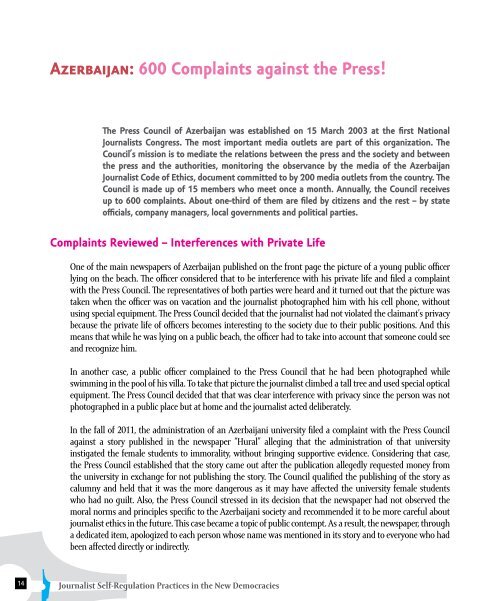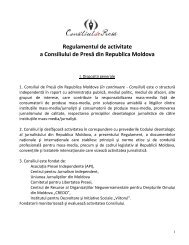Journalist Self-Regulation Practices in the New Democracies - Unesco
Journalist Self-Regulation Practices in the New Democracies - Unesco
Journalist Self-Regulation Practices in the New Democracies - Unesco
You also want an ePaper? Increase the reach of your titles
YUMPU automatically turns print PDFs into web optimized ePapers that Google loves.
Azerbaijan: 600 Compla<strong>in</strong>ts aga<strong>in</strong>st <strong>the</strong> Press!<br />
The Press Council of Azerbaijan was established on 15 March 2003 at <strong>the</strong> first National<br />
<strong>Journalist</strong>s Congress. The most important media outlets are part of this organization. The<br />
Council’s mission is to mediate <strong>the</strong> relations between <strong>the</strong> press and <strong>the</strong> society and between<br />
<strong>the</strong> press and <strong>the</strong> authorities, monitor<strong>in</strong>g <strong>the</strong> observance by <strong>the</strong> media of <strong>the</strong> Azerbaijan<br />
<strong>Journalist</strong> Code of Ethics, document committed to by 200 media outlets from <strong>the</strong> country. The<br />
Council is made up of 15 members who meet once a month. Annually, <strong>the</strong> Council receives<br />
up to 600 compla<strong>in</strong>ts. About one-third of <strong>the</strong>m are filed by citizens and <strong>the</strong> rest – by state<br />
officials, company managers, local governments and political parties.<br />
Compla<strong>in</strong>ts Reviewed – Interferences with Private Life<br />
One of <strong>the</strong> ma<strong>in</strong> newspapers of Azerbaijan published on <strong>the</strong> front page <strong>the</strong> picture of a young public officer<br />
ly<strong>in</strong>g on <strong>the</strong> beach. The officer considered that to be <strong>in</strong>terference with his private life and filed a compla<strong>in</strong>t<br />
with <strong>the</strong> Press Council. The representatives of both parties were heard and it turned out that <strong>the</strong> picture was<br />
taken when <strong>the</strong> officer was on vacation and <strong>the</strong> journalist photographed him with his cell phone, without<br />
us<strong>in</strong>g special equipment. The Press Council decided that <strong>the</strong> journalist had not violated <strong>the</strong> claimant’s privacy<br />
because <strong>the</strong> private life of officers becomes <strong>in</strong>terest<strong>in</strong>g to <strong>the</strong> society due to <strong>the</strong>ir public positions. And this<br />
means that while he was ly<strong>in</strong>g on a public beach, <strong>the</strong> officer had to take <strong>in</strong>to account that someone could see<br />
and recognize him.<br />
In ano<strong>the</strong>r case, a public officer compla<strong>in</strong>ed to <strong>the</strong> Press Council that he had been photographed while<br />
swimm<strong>in</strong>g <strong>in</strong> <strong>the</strong> pool of his villa. To take that picture <strong>the</strong> journalist climbed a tall tree and used special optical<br />
equipment. The Press Council decided that that was clear <strong>in</strong>terference with privacy s<strong>in</strong>ce <strong>the</strong> person was not<br />
photographed <strong>in</strong> a public place but at home and <strong>the</strong> journalist acted deliberately.<br />
In <strong>the</strong> fall of 2011, <strong>the</strong> adm<strong>in</strong>istration of an Azerbaijani university filed a compla<strong>in</strong>t with <strong>the</strong> Press Council<br />
aga<strong>in</strong>st a story published <strong>in</strong> <strong>the</strong> newspaper “Hural” alleg<strong>in</strong>g that <strong>the</strong> adm<strong>in</strong>istration of that university<br />
<strong>in</strong>stigated <strong>the</strong> female students to immorality, without br<strong>in</strong>g<strong>in</strong>g supportive evidence. Consider<strong>in</strong>g that case,<br />
<strong>the</strong> Press Council established that <strong>the</strong> story came out after <strong>the</strong> publication allegedly requested money from<br />
<strong>the</strong> university <strong>in</strong> exchange for not publish<strong>in</strong>g <strong>the</strong> story. The Council qualified <strong>the</strong> publish<strong>in</strong>g of <strong>the</strong> story as<br />
calumny and held that it was <strong>the</strong> more dangerous as it may have affected <strong>the</strong> university female students<br />
who had no guilt. Also, <strong>the</strong> Press Council stressed <strong>in</strong> its decision that <strong>the</strong> newspaper had not observed <strong>the</strong><br />
moral norms and pr<strong>in</strong>ciples specific to <strong>the</strong> Azerbaijani society and recommended it to be more careful about<br />
journalist ethics <strong>in</strong> <strong>the</strong> future. This case became a topic of public contempt. As a result, <strong>the</strong> newspaper, through<br />
a dedicated item, apologized to each person whose name was mentioned <strong>in</strong> its story and to everyone who had<br />
been affected directly or <strong>in</strong>directly.<br />
14 <strong>Journalist</strong> <strong>Self</strong>-<strong>Regulation</strong> <strong>Practices</strong> <strong>in</strong> <strong>the</strong> <strong>New</strong> <strong>Democracies</strong>



